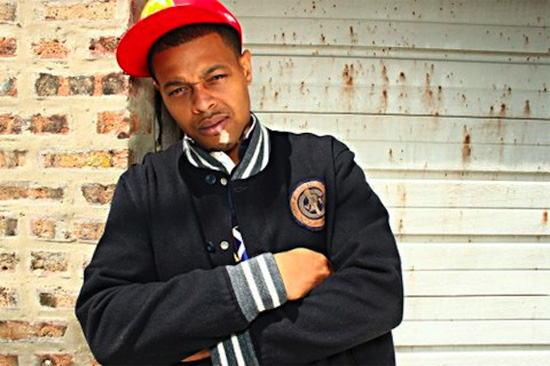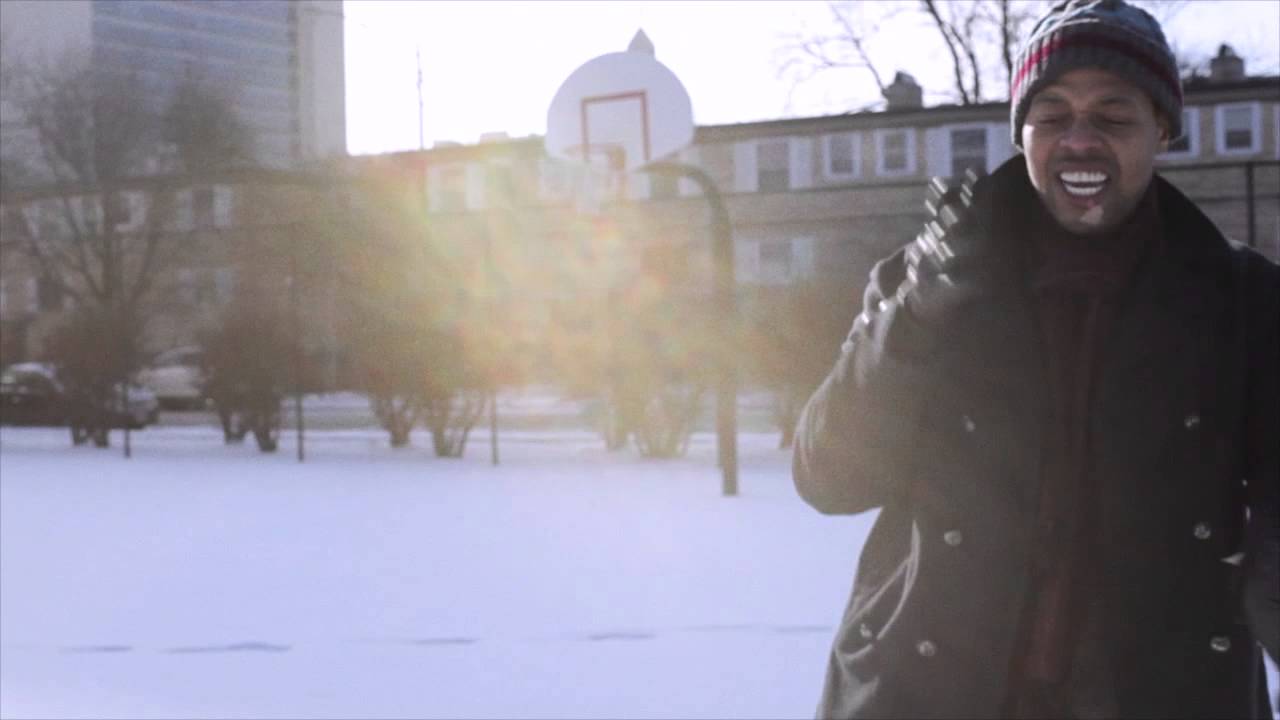The sound of Chicago rap might not be as obviously pinned down as in New York, California or Atlanta, but right now it’s unmistakably a city in the limelight. Sadly, it’s against the heart-breaking backdrop of the poverty and gun violence which has squeezed the life out of residents in the South and West Side neighbourhoods for more than four decades – but in these grim circumstances rap music has never sounded so vital. The voices of disenchanted young people have taken many different forms – from the nihilistic to the empathetic – and while the temptation might be to contrast these styles against each other and draw simple conclusions, Chicago’s rap community feels surprisingly unified.
Even so, as major labels swoop and scramble to monetise this new creative spring, there’s also a need for a mature, calming presence, lest Chicago’s growing identity be diluted in the excitement of the public eye. At 29 years old, Tree is a rapper/producer who can remember when the spotlight last settled on the city in the wake of The College Dropout, only to watch it move on after Kanye became an international star. In the ten years since that release he has been refining his own sound which he has coined Soul Trap – wrapping vintage pop and soul samples around the rattle and clap of modern, southern hip-hop drums. It has little to do with the menacing drill anthems being cooked up by Young Chop and Chief Keef, or the jazzy eclecticism that laces the excellent new Chance The Rapper tape, yet Tree wants to put an arm around all of these things and help nurture his city in any way he can.
He is an exceptionally gifted producer; taking big, bold sample choices and contorting them into refreshingly different, often complex shapes. Tree productions tend to put beautiful singing voices right to the fore, amplifying the human quality of his songs which is also tangled up within his own gravelly vocals. He raps with the throatiness of Tom Waits in full cookie monster flow, seemingly straining out of desperation (or from the effects of a lifelong 40-a-day cigarette addiction.) Even on the most surface of levels this is music that feels ‘soulful’, and yet underneath the booming sub-bass and jittery hi hats are personal stories that bring further layers of emotional depth.
Up until now Tree has mostly released his music in rough, unmastered mixtapes and EPs – the graininess of which almost adds to their weathered charm – but last year’s Sunday School was a turning point. Nationwide acclaim and new opportunities followed in its path, and for its sequel he will even be recording in a proper studio for the first time. Between the recording sessions for that release the Quietus caught up with Tree to talk life in Chicago, his favourite singers and Sunday School II: When Church Lets Out (which you can listen to via the embed below.)
Where in Chicago were you raised, and how would describe your life growing up there?
Tree: I grew up a mile from Chicago’s prized downtown Loop, or Magnificent Mile, in one of the city’s biggest project communities called ‘Cabrini O Green’, or ‘Cabrini-Green’… However you wanna say it, it’s the projects. My life growing up was a good one, even coming up in an impoverished state and not having much. Being honest, I didn’t realise we were broke until I came of age in my adolescence – all I can remember were the good times. Whether it was flipping on old thrown out mattresses or knowing that the neighbourhood basketball courts were flooded with people I knew, there was always something to do.
There was always war as well. Rival gangs would shoot in broad daylight outside of schools. That was the beginning of the modern Chicago gun violence and the ‘don’t give a fuck’ attitude carried by so, so many underprivileged and misguided youth. There were days where me and my brothers would leave the community for downtown Chicago and walk around all day, which eventually led to us hustling – shining shoes, washing windows, begging or whatever. That was an escape and also an alternative to what was going on where we lived.
Being a little bit older than the average breakthrough artist, would you say you approach music with a different perspective to the younger rappers from the area?
T: Definitely, and what I mean by that is I’m more mature now, not only psychologically but musically as well. I’m 29 but I’ve been rapping and recording from my home for 13 years, which means I’ve been through phases and taught myself all styles of rap and hip-hop music. I once rapped fast, I used to make club songs, and whatever other variation of rapping you can think of. I’ve used every cadence, bridge and drop there is. The young ‘uns are still learning how to make music, how to challenge themselves artistically and lyrically. I’m so comfortable in my skin musically that opinions don’t matter to me. I’ve been doing this long enough to say that I do music because I’m great at it – others do music with intentions on becoming great from it.
The way you blend traditional pop and soul samples with southern hip-hop drums isn’t like any other producer I’ve heard before. Which beatmakers did you look up to when you first started producing?
T: When I was coming up, producers weren’t being given the credit and spotlight that they are today. In 1997/98 there were two or three famous producers that I knew of… Mannie Fresh, Dr Dre and Timbaland, and as you can see I didn’t steal their sound. I create what I like, what I love, and that’s the bottom line. Don’t get me wrong, there are songs I love, like Geto Boys’ ‘Mind Playin’ Tricks on Me’ – but I don’t know who made that beat. Back then, producers weren’t as publicly known as they are today. I’m more influenced by bands, singers, and orchestras. I love Maceo parker and people like that. Amy Winehouse, Aretha Franklin. Good, soulful, heartfelt shit, ya know.
You mention Amy Winehouse and I know you’ve sampled her a few times – when did you first hear Amy’s voice and what was it that you liked about it?
T: I love that women, she was a treasure to us all. I first heard ‘Me & Mr Jones’ and I knew. I have that ear… maybe after a ten year run I can be an A&R or start my own label, because I know good music [laughs]. Amy, Lauryn, Aretha, Whitney… I can go on and on for days. These are the people that influence me. Even though we are in different genres and all-together types of musical expression, I know how it feels when you hear great music. It’s undeniable. So when you make a song and you get the type of response that they get or got, then you’ve been influenced by them.
You’ve definitely sampled some big, amazing voices, but I also think you use your own voice really effectively as well. How important would you say human voices in general are in your production?
T: Voices are key. In rap and singing – hell, even a DJ has to have a nice voice if he wants to be the ‘it’ guy. You can be the best rapper alive, but if the public hates your voice they’ll never buy your record or come to see you live. I always knew I had a peculiar voice, and even now I meet fans and after chatting with them they say "Oh my god, you really do sound like that!" Hey, I guess I’m blessed with my fucked up voice. [laughs]
I like the mix of obscure but also really well-known samples in your music. Do you go digging for those samples, or what’s your approach to making a beat?
T: Nowadays I get all my samples from YouTube. Thank god. I used to spend my whole two weeks’ check on albums and CDs of ‘oldie but goodies’ at the record stores. My process now is simple, I skim through YouTube videos for a day or two then I slowly begin to conjure up different beats throughout the week. Most of the time I chop a sample to an already standing drum beat and it usually falls into place.
What would you say are the main differences between Sunday School I and II? Has the success of the first one helped the recording process this time?
The first Sunday School release was recorded by me, for me, in a secluded suburb of Atlanta called Lawrenceville. I was sad, angry, homesick, and broke. I made tens of year-end lists last year with Sunday School, but it wasn’t even mixed or mastered! The sound quality wasn’t there but the music was phenomenal… better than everybody’s, if you ask me. It was something new. I had no management, no direction… I recorded out of my room, I sent out all my emails and they went viral just off the music and the videos. Now, Sunday School II is me against myself and my own music. This time around I’m competing with Sunday School I and trying to get even more acclaim, fame and cash than I did last year. As far as music goes, I stepped it up a little. I’m tellin’ stories, I’m singing, I’m gangster – I’m human. I used a few beats from other producers this time too, and you can expect to see a couple of guest appearances from guys like Danny Brown and Roc Marciano.
Going back to Chicago for a minute, your Tree Ft. The City compilation was an interesting snapshot of city’s rap scene. What elements of Chicago were you trying to reflect with that release?
T: Being totally honest, I just wanted to be Chicago’s big brother. Our city is in the spotlight, on the radar… everyone’s looking at us. The labels have an idea what Chicago music is, but Chicago isn’t Drill music. We aren’t Soul Trap either. We’re the middle of the country, which means we embody East Coast rap, West Coast rap, and the ever-so-apparent southern rap. We are a mixing pot of all genres, musically. We are the Chi-Lites. We are Curtis Mayfields. With this project I was getting a lot of attention through labels and the internet, and I just really wanted to set the record straight about what Chicago sounds like. There are a handful of artists right now in Chicago that could be the next B.I.G. or Jay-Z, but when you come expecting to hear a certain sound then you miss out on the gems that are buried that real Chicagoans love and champion. So I just wanted to put everybody on the same stage and attach my name to them on the production or what have you. I just wanted to give back and be the good guy who is approachable and not ‘too Hollywood’, as they say. As a side note, two or three artists have been contacted by labels through that project, so mission accomplished!
While we’re on the subject of Chicago, I have to ask about the city’s on-going struggle against violent crime. Looking from the inside, how can things improve and how does it feel having the media spotlight shone on the city?
T: It’s just plain ol’ Chicago for the average impoverished Chicagoan – we deal with it. It’s nothing new. More babies will die, more cops will shoot suspected killers who turn out to be hard working college students. If it really was a problem they’d fix it. How do you fix it? Hire felons. Create jobs. Build recreational centres in poor neighbourhoods that have nothing but the corner and liquor stores to look forward to. Get in these neighbourhoods and speak with the people about their conditions instead of questioning them like the enemy. Stop dividing the people. Stop locking up our leaders, because they’re there for a reason. Media coverage doesn’t help the people, it just reminds the police, the alderman and the mayor how badly they’re fucking up and hints at their total disregard for certain areas that they don’t invest in or properly attend to. So now, because the city is on CNN or some major news outlet reporting on the violence, now they feel they gotta go crack a few heads and let the people know who’s really in charge? Fuck outta here with that shit. If ‘criminals’ had jobs they wouldn’t commit crimes. Fact.
Tree’s Sunday School II mixtape is out now. For more, click here to visit his Soundcloud page.




